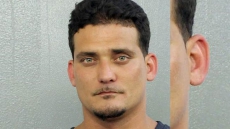A UK court today ordered extradition to the US of an Indian-origin futures trader arrested for his alleged role in the 2010 Wall Street "flash crash" which wiped nearly $1 trillion off the value of US shares in minutes.
London-based Navinder Singh Sarao, 37, must now be extradited to the US within 28 days to face charges that he contributed to the May 2010 crash, when the Dow Jones share index in New York briefly fell by more than 1,000 points.
At the High Court, Lord Justice Gross said it was "clear" the court must turn down his application against extradition.
Mr Sarao denies all 22 charges brought against him by US authorities. He faces a maximum sentence of 380 years.
American prosecutors allege Mr Sarao made millions of dollars through online trades from his parents' west London home which amounted to market manipulation and caused the 1,000-point fall on the Dow Jones index on May 6, 2010.
The 22 charges he faces include fraud and "spoofing" - the practice of buying or selling with the intent to cancel the transaction before execution.
He has previously told the court that he was simply "being good at my job".
The US justice department claims Sarao and his company Nav Sarao Futures Limited made $ 878,000 of profit from the flash crash and a total of 26 million pounds illegally over five years.

He was arrested by British police on a US warrant in April last year and has been indicted by a US federal grand jury on 22 criminal counts, including wire fraud, commodities fraud, commodity price manipulation and attempted price manipulation.
The former bank worker and Brunel University student, who lives and worked out of his parents' home in Hounslow near Heathrow airport, is accused of using an automated trading program to "spoof" markets.
During the course of hearings last year, it emerged that he suffers from Asperger's syndrome, a form of autism.
The so-called "flash crash" saw the Dow Jones industrial average briefly plunge more than 1,000 points on May 6, 2010, temporarily wiping out nearly $1 trillion in market value.
Sarao has already spent four months in prison last year after failing to meet five-million-pound bail terms because his assets had been frozen.
He was freed in September last year after US authorities agreed he could be released on bail of 50,000 pounds.





